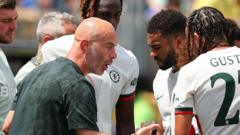Is Talking to Someone the Key to Better Mental Health? Pimblett Weighs In!

# UFC Star Paddy Pimblett Discusses Mental Health and Supportive Friendships
## Introduction
In the world of sports, mental health is a topic that has gained significant attention in recent years, especially among athletes who often face immense pressure to perform. UFC fighter Paddy Pimblett has emerged as a vocal advocate for mental health awareness. His candid discussions about personal struggles and the importance of supportive relationships resonate deeply with fans and fellow athletes alike. In a recent conversation with BBC Sport's Sam Harris, Pimblett opened up about his own experiences and the critical role that friendships play in mental well-being.
## The Importance of Mental Health in Sports
Mental health in sports is a crucial yet often overlooked aspect of an athlete's overall performance. The pressures of competition, public scrutiny, and the physical demands of training can contribute to mental health challenges.
### Common Mental Health Issues in Athletes
- **Anxiety Disorders**: The fear of failure or underperforming can lead to heightened anxiety.
- **Depression**: Many athletes experience periods of low mood, especially after significant losses or injuries.
- **Substance Abuse**: Some may turn to alcohol or drugs as a form of coping.
- **Eating Disorders**: Body image issues can lead to unhealthy eating habits and behaviors.
### The Stigma Surrounding Mental Health
Despite the increasing awareness of mental health issues, stigma still exists. Many athletes feel pressured to maintain a tough exterior, leading to reluctance in seeking help. This culture of silence can have devastating effects.
## Paddy Pimblett's Journey
Paddy Pimblett has not shied away from discussing his mental health struggles. He emphasizes that mental health is just as important as physical health, especially in a high-stakes environment like the UFC.
### Personal Experiences
Pimblett has openly shared his battles with anxiety and depression, highlighting how these issues can affect anyone, regardless of their success or status. His candidness serves as a reminder that vulnerability is not a weakness but rather a step toward healing.
### The Role of Friendship
In his discussions, Pimblett often mentions his close friendship with fellow fighter Molly McCann. Their bond has been instrumental in both of their journeys, providing a support system that fosters open communication about mental health.
## The Impact of Supportive Relationships
Supportive relationships can significantly influence mental health, particularly for athletes. Here’s how:
### Emotional Support
- **Listening Ear**: Having someone to talk to can alleviate feelings of isolation.
- **Encouragement**: Friends can motivate each other during tough times, fostering resilience.
- **Understanding**: Friends who share similar experiences can provide unique insights and empathy.
### Practical Support
- **Training Together**: Shared training sessions can uplift spirits and create camaraderie.
- **Accountability**: Friends can help each other stay on track with mental health goals.
- **Resource Sharing**: Friends can recommend mental health resources, therapy, or coping strategies.
## Building a Support Network
Creating a supportive network is essential. Here are some steps to consider:
### Identify Supportive Individuals
- **Friends**: Start with close friends who understand your journey.
- **Family**: Involve family members who can provide emotional support.
- **Professional Help**: Don’t hesitate to reach out to mental health professionals.
### Foster Open Communication
- **Be Honest**: Share your thoughts and feelings openly with your support network.
- **Create Safe Spaces**: Encourage discussions about mental health without judgment.
- **Practice Active Listening**: Be there for others and allow them to voice their struggles.
### Participate in Community Activities
Engaging in community initiatives or support groups can help expand your network. This interaction fosters a sense of belonging and collective healing.
## The Role of Sports Organizations
Sports organizations are beginning to recognize the importance of mental health in athletics. Initiatives are being developed to provide athletes with the tools and resources they need.
### Mental Health Resources
- **Workshops and Seminars**: Many organizations now offer mental health training to athletes.
- **Access to Professionals**: Athletes can benefit from on-site psychologists and counselors.
- **Mental Health Days**: Some organizations are now allowing athletes to take time off for mental health reasons without stigma.
## The Way Forward
As conversations about mental health continue to evolve, it is crucial for athletes like Paddy Pimblett to lead by example. By sharing their stories, they can break down barriers and encourage others to seek help.
### Promoting Awareness
- **Social Media Advocacy**: Athletes can use their platforms to promote mental health awareness.
- **Public Speaking**: Engaging in talks and seminars can spread the message further.
- **Collaborations**: Partnering with mental health organizations can amplify efforts.
### Normalizing Conversations
It is essential to normalize discussions around mental health in sports. Initiatives can include workshops, training sessions, and open forums that encourage dialogue.
## Conclusion
Paddy Pimblett’s journey highlights the significance of mental health awareness, especially in the high-pressure environment of professional sports. His friendship with Molly McCann showcases the power of supportive relationships in overcoming mental health challenges. By continuing to promote open conversations and seeking help, athletes can pave the way for a healthier future in sports.
In a world where mental health is becoming increasingly recognized, it’s time for everyone—athletes and fans alike—to prioritize their well-being. What steps can you take to foster supportive relationships in your life?
### FAQs
What mental health issues do athletes commonly face?
Athletes commonly face issues like anxiety disorders, depression, substance abuse, and eating disorders. The pressure to perform can significantly impact their mental well-being.How can friendships help with mental health?
Friendships can offer emotional support, understanding, and practical help, making it easier for individuals to navigate their mental health challenges.What can sports organizations do to support mental health?
Sports organizations can provide mental health resources, access to professionals, and create an environment where mental health days are accepted without stigma. ### Call to Action Prioritize your mental health and seek out supportive relationships in your life. Together, we can create a culture that values mental well-being just as much as physical performance. #MentalHealthMatters #SupportEachOther #UFCCommunityPublished: 2025-06-24 05:17:09 | Category: sport



